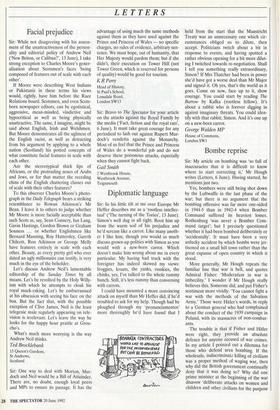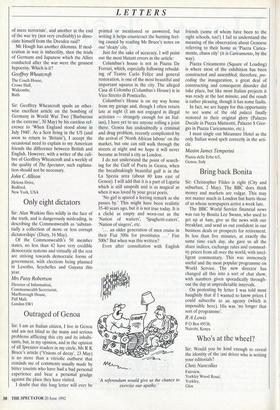Bombe reprise
Sir: My article on bombing was `so full of inaccuracies that it is difficult to know where to start correcting it,' Mr Hough writes (Letters, 6 June). Having started, he mentions just two.
Yes, bombers were still being shot down by the Luftwaffe in the last phase of the war; but there is no argument that the bombing offensive was far more one-sided in 1944-5 than in 1942-4 when Bomber Command suffered its heaviest losses. Rothenburg `was never a Bomber Com- mand target'; but I precisely questioned whether it had been bombed deliberately or 'accidentally'. It must have been a very unlucky accident by which bombs were jet- tisoned on a small hill town rather than the great expanse of open country in which it stood.
More generally, Mr Hough repeats the familiar line that war is hell, and quotes Admiral Fisher: `Moderation in war is imbecility.' I wonder if Mr Hough really believes this. Someone did, and put Fisher's sentiment more vividly: `You cannot fight a war with the methods of the Salvation Army.' Those were Hitler's words, in reply to a German general who had complained about the conduct of the 1939 campaign in Poland, with its massacres of non-combat- ants.
The trouble is that if Fisher and Hitler were right, they provide an absolute defence for anyone accused of war crimes. In my article I pointed out a dilemma for those who defend area bombing. If the wholesale, indiscriminate killing of civilians was a proper method of waging war, then why did the British government continually deny that it was doing so? Why did one prime minister at the beginning of the war disavow `deliberate attacks on women and children and other civilians for the purpose
LETTERS
of mere terrorism', and another at the end of the war try (not very creditably) to disso- ciate himself from the Dresden raid?
Mr Hough has another dilemma. If mod- eration in war is imbecility, then the trials of Germans and Japanese which the Allies conducted after the war were the grossest hypocrisy. Which is it?
Geoffrey Wheatcroft
The Coach House, Crowe Hall, Widcombe, Bath



























































 Previous page
Previous page